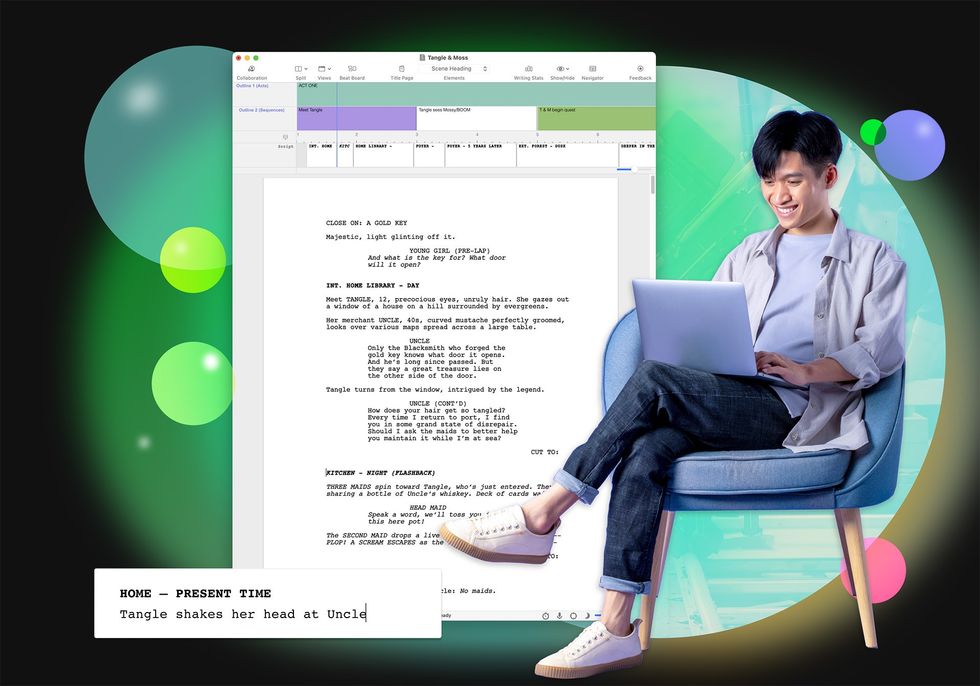
Generally speaking, you can write a screenplay on just about any word processor on the market (even Microsoft Word! But please don’t). That being said, if you want your script to look professional and to be produced it’s more-than-advised (most likely required) that you bang out your script using a popular industry-standard software like Final Draft.
Final Draft is built to get writers into a disciplined workflow that incorporates a dedicated toolset to benefit production. It’s so standard, in fact, that other high-profile writing programs (such as Fade In, for example) allow you to output a .fdx file. (For any curious, .fdx and .fdr are Final Draft’s two compatible file types).
Final Draft 12 (2021) was a behemoth that hosted incremental updates over the years, allowing for increased usability since its release. I say “was” because we now have the surprise release of Final Draft 13, which aims to refine your writing process by letting you customize your preferences with much more creative control.
Let’s dig into Final Draft’s new software announcement to find out more.
Final Draft 13

According to President of Final Draft Shelly Mellot, this new update is about ensuring that “writers have more tools than ever to enhance productivity.”
Creatives will find a robust set of features to refine their writing process to meet their specific needs with the release of Final Draft 13.
- Goal Setting and Productivity Tools – Set writing goals and track your progress. Record your longest writing streak, current writing streak, peak days, and peak times to help you write more when you write best. This valuable insight into your writing habits and productivity helps to identify trends, which can then be shared for accountability!
- Navigator 2.0 – Customize your Navigator for a full view and control of your script. Outline directly in the Navigator, edit scene headings, and monitor inclusivity stats.
- Character Development Tools – Use the new Navigator 2.0 to explore your characters. Track how much screen time each character gets, see how often different characters interact, and even assign voices to characters who can read your script back to you.
- Emoji – Sprinkle emoji across scripts, beats, title pages, and ScriptNotes. Craft more realistic on-screen text and social media exchanges while making your notes more expressive.
- Typewriter – Kick it old-school with a new typewriter-like view option that automatically scrolls to keep the line you’re working on centered, improving focus and ergonomics.
- Midnight Mode – Take Night Mode to the edge with a sleek new alternative dark view theme.
- Enhanced Outline Editor – Add, label, and customize lanes in Outline Editor for more organized, effective story planning.
- Improved Beat Board – Customize your Beats to display only what you want to see and how you want to see it.
- Structure Lines – Assign colors to outlines, acts, sequences, and scenes to track them visually in your script.
- Improved Beat Board – Customize your Beats to display only what you want to see and how you want to see it.
- Structure Lines – Assign colors to outlines, acts, sequences, and scenes to track them visually in your script.
- Custom-Color PDFs – Create printable files that pop in Night Mode, Midnight Mode, and your own themes.
A Screenwriter’s Thoughts

I’ve been writing extensively for the past eight years and began my writing career on CeltX before moving on to Final Draft 8. Since then, I’ve used Writer’s Duet and Final Draft 12 before settling into Highland 2 for my personal projects.
Seeing these new features is exciting and gives me some interesting ideas on how to implement modern conversations into my scripts. While I’d never consider putting emojis into my screenplay unless it was in dialogue, it is a great addition to bringing Final Draft into 2024. In fact, have a texting scene in an older script that would benefit from the addition of emojis.
The Character Development tools are also really intriguing. I often find that I have a character or two that don’t get enough screen time or usage. Unfortunately, I usually find this in late drafts, so having some tools to really get an idea of what I’m doing early on is great.
I’m also curious to see how the voices feature will work.
And while Typewriter Mode and Midnight Mode have already been implemented into other programs I’ve used, it’s nice to see Final Draft catching up to the conforming masses.
If you’d like to upgrade to Final Draft 13 or jump into the software for the first time, visit the Final Draft website to learn more.
At a glance, these new updates bring some welcome features that make Final Draft even better. But we’ll have to use it a bit to really understand how this new update benefits writers who are currently using Final Draft 12.
If you get a chance to check it out let us know what you think in the comments below.
Author: Yaroslav Altunin
This article comes from No Film School and can be read on the original site.
